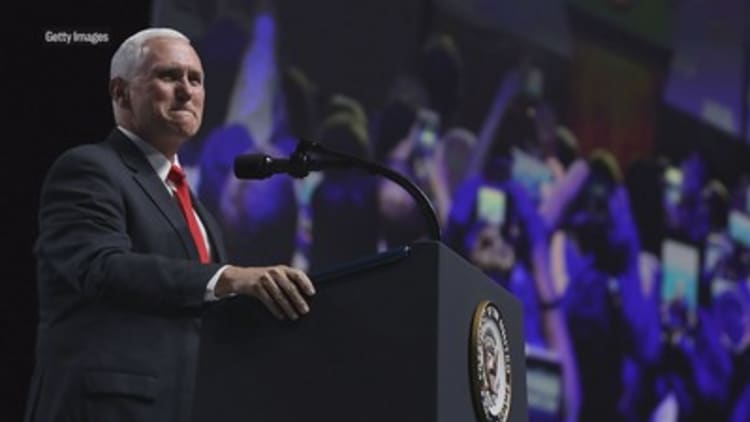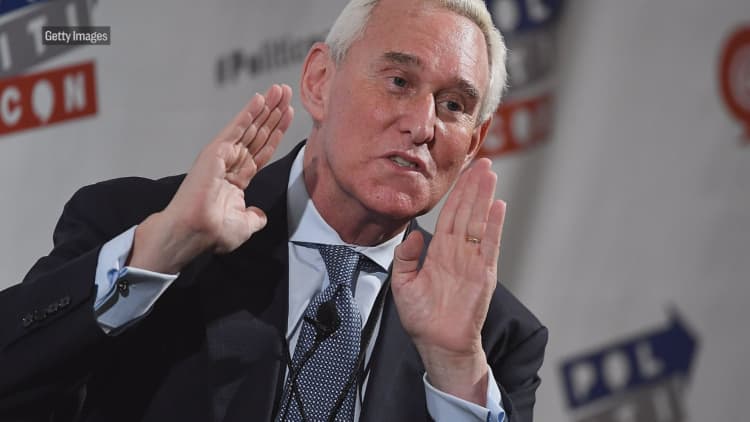Thursday marks one year to the day since special counsel Robert Mueller began his investigation of the links between Russia and the Trump campaign.
The various probes into Russian election interference did not start on May 17, 2017, however. Federal authorities had been investigating the Kremlin's attempts to sway the 2016 presidential election long before Mueller was appointed by Deputy Attorney General Rod Rosenstein. And the special counsel was preceded by multiple congressional inquiries, a number of which are ongoing.
But the appointment of such a high-profile investigative body, and such a high-profile lead investigator, instantly established Mueller's probe as the cause celebre upon which President Donald Trump's political future could potentially hinge.

Mueller was initially heralded across political battle lines as a competent and unbiased choice for the role. Former Republican House Speaker Newt Gingrich, a vocal supporter of the president and the author of "Understanding Trump," said at the time of Mueller's appointment that he was a "superb choice to be special counsel. His reputation is impeccable for honesty and integrity."
That bipartisan praise quickly collapsed as the investigation moved forward, however, giving way to accusations of political malfeasance and extrajudicial overreach from critics.
The president's view
The special counsel's chief detractor has been the president himself. Trump, in heated public remarks and on social media, has repeatedly decried the probe as a "witch hunt." His animus has stoked fears that Trump plans to fire Mueller, prompting some Democratic lawmakers to create legislation that would protect the special counsel from such an attack. Mueller was appointed after President Trump fired FBI Director James Comey who had been leading the investigation into Russian meddling.
While the White House has been circumspect about whether Trump plans to fire the special counsel, press secretary Sarah Huckabee Sanders said in recent months that "the president is clear that he feels it's gone too far" and that he believes he has the power to fire Mueller. Vice President Mike Pence recently said of the special counsel: "It's time to wrap it up."
The White House did not immediately respond to CNBC's request for comment.
In a tweet marking the special counsel's anniversary, Trump called the investigation "the greatest Witch Hunt in American History."
But the special counsel has already had a material impact on a number of key players in the orbits of both Trump and the Kremlin, issuing more than a dozen indictments and collecting a handful of guilty pleas.
As the investigation moves into its second year, its trajectory and core focus — collusion, obstruction of justice, financial crimes or other matters — remain opaque. Here's what we've seen so far:
George Papadopoulos
A New York Times report marked July 2016 as the start of the FBI's inquiry into Trump-Russia coordination. It was prompted by Papadopoulos, at the time a little-known campaign advisor, who told an Australian diplomat in May of that year that he knew Russia had acquired thousands of emails on Trump's political opponent, Hillary Clinton, the Times reported, citing multiple current and former officials.
The Australian diplomat reportedly passed that information to his American counterparts, sparking the federal inquiry.
Papadopoulos was questioned by the special counsel and pleaded guilty to lying to federal investigators on Oct. 5, 2017. As part of his plea agreement, Papadopoulos agreed to cooperate with the government. His sentencing is now contingent on continuing to "respond and provide information regarding any and all matters as to which the government deems relevant."
Michael Flynn
The former national security advisor was fired just a few weeks after Trump's inauguration in January 2017. The White House said he was ousted for misleading the vice president about his contacts with Russian Ambassador Sergey Kislyak.
The special counsel charged Flynn with lying to the FBI, also over his contacts with Kislyak. He pleaded guilty on Dec. 1, 2017, and has agreed to "cooperate fully, truthfully, completely, and forthrightly" with law enforcement authorities.
Rick Gates and Paul Manafort
Manafort was Trump's campaign chief during the summer of 2016 and was supported by Gates, his close associate. Manafort held deep connections to Ukrainian politics, having worked for parties supportive of former Ukrainian President Viktor Yanukovych, who fled to Russia after his ouster in 2014.
The special counsel levied dozens of counts against Manafort and Gates alleging money laundering, misleading law enforcement officials and bank fraud.
Gates pleaded guilty in February to one count of lying to investigators and one count of conspiracy against the United States.
Manafort, however, has pleaded not guilty and continues to maintain his innocence. His lawyers have argued that the special counsel's actions against him exceed its authority, and they filed a motion to dismiss the charges against him. On Wednesday, the judge presiding over his case denied Manafort's bid and said the case will go to trial.
Peter Strzok and Lisa Page
Strzok and Page, former members of Mueller's team, became the driving force behind accusations of political bias in the special counsel's team after their text message exchanges during the 2016 campaign were revealed.
Some of the thousands of texts between the two former investigators, who were reportedly involved in an extramarital affair, appeared to show hostility toward then-candidate Trump. The texts have been reviewed by multiple Republican-led congressional committees.
Trump, too, has hinted the texts reveal shady tactics by the special counsel and the Justice Department.
Internet Research Agency
In February, Mueller's team levied indictments against 13 Russian individuals and three Russian entities it alleged were involved in various efforts to meddle in the U.S. election. All of the defendants received conspiracy charges, and some were charged with identity theft and conspiracy to launder money.
Trump later imposed sanctions on many of the individuals and entities included in Mueller's indictments.
Michael Cohen
On April 9, federal agents raided office and residence of Trump's attorney, Michael Cohen. The agents seized numerous electronic devices and boxes of documents. Records related to payments made to porn star Stormy Daniels to secure her silence regarding an alleged affair with the president could be included, according to the New York Times.
Stephen Ryan, a lawyer for Cohen, told The New York Times that the raids were, "in part, a referral by the office of special counsel, Robert Mueller."
Lawyers for Trump have intervened in the court proceedings surrounding Cohen's seized materials. The materials are now being reviewed to determine which, if any, are protected by attorney-client privilege.
Roger Stone
A longtime political operative in Washington, Stone has become a focus of Mueller's probe, CNBC reported earlier in May, citing sources with direct knowledge of the matter.
Specifically, Mueller is looking into alleged meetings between Stone and Gates before and during the campaign, the sources told CNBC.
Stone has previously praised the hacker known as "Guccifier 2.0" who allegedly stole emails from the Democratic National Committee. Stone, in a leaked email, said he dined with Julian Assange, the founder of Wikileaks, which published the stolen emails.
Stone later denied that he ever met with Assange and said the email was a joke.
WATCH: Mueller focuses on links between Roger Stone & Rick Gates



